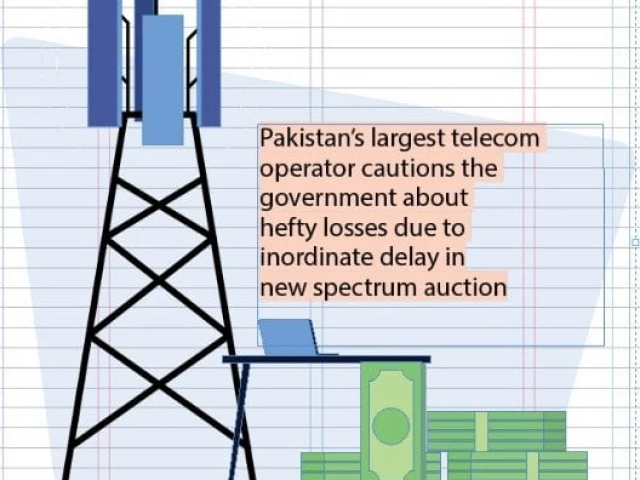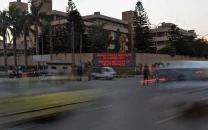$1.8b at risk on spectrum auction delay
Network congestion is crippling services; merger dispute delays 5G auction

Pakistan may lose $1.8 billion in the next two years in case of any further delays in the auction of frequency spectrum, as the existing allocated space has almost been consumed, the country's largest telecom operator has warned the prime minister.
Network congestion has become a recurring problem, and users are experiencing degraded service quality, stated Aamir Ibrahim, Chief Executive Officer of Jazz, in a letter to Prime Minister Shehbaz Sharif. Ibrahim, whose company holds about 37% of the market, said the premier's Digital Pakistan vision was at risk because of an inordinate delay in the auction.
"If the 2025 auction is delayed indefinitely or fails due to a suboptimal policy environment, Pakistan risks GDP losses of $1.8 billion, or Rs500 billion," Ibrahim cautioned. He added that losses could rise to $4.3 billion, or Rs1.2 trillion, if delays continue until 2030.
Spectrum is a portion of the electromagnetic wave allocated to mobile network operators for transmitting and receiving signals used in services such as 4G, 5G, Wi-Fi, and broadcasting.
Jazz complained that ongoing delays in the spectrum auction were hurting both customers and the economy. "I'm compelled to write about the alarming delay in the mega initiative of frequency spectrum auction that risks undermining your vision of Digital Pakistan," Ibrahim told the prime minister.
Minister for Information Technology, Shaza Fatima Khawaja, recently said the main reason for the delay in the 5G spectrum auction was ongoing litigation and uncertainty surrounding the Pakistan Telecommunication Company Limited (PTCL)-Telenor merger. She explained that the 5G Spectrum Auction Advisory Committee, chaired by the finance minister, would make recommendations only after the Competition Commission of Pakistan (CCP) issues its verdict on the merger.
Jazz currently holds 37% of the market, followed by Zong with about 25%, Telenor Pakistan with 23%, and Ufone — a PTCL subsidiary — with 13% of total SIM holders. The PTCL-Telenor merger, if approved, will create the single largest player in the market.
In its letter, Jazz referred to Pakistan Telecommunication Authority (PTA) data, noting that mobile data usage has grown by more than 45% in just two years. The number of smartphones on networks has also doubled during this period and now represents over half of all cellular users.
Despite this surge, the letter added, spectrum allocated to operators has not increased since 2021.
"Pakistan faces a dire spectrum scarcity. Our assignment of only 270MHz is among the lowest in the Asia-Pacific region, compared to a regional average of over 700MHz. To serve as a tangible example spectrum allocation on a per user basis in Pakistan is less than one-fourth that of Japan," Ibrahim highlighted.
He said the industry had already deployed all possible technical measures to maximise efficiency of utilisation of the existing spectrum assignments, but congestion on networks was expected to worsen further in the coming months.
Without timely release of additional spectrum, operators are struggling to handle growing traffic. This has led to degraded user experiences, with ordinary citizens suffering from poor internet quality, Ibrahim added.
He stressed that at a time when digital infrastructure is critical for education, healthcare, IT exports, freelancers, and economic growth, spectrum limitations could undermine the true achievement of Digital Pakistan.
Telecom operators have also voiced concerns about the high cost of doing business, blaming it on license fees that must be paid in foreign currency. The cost of spectrum, they said, has jumped from 13% of revenues in 2018 to nearly one-fourth by 2023.
Jazz noted that despite the prime minister's direction in May last year to issue new spectrum, there has been no progress on either a new policy or the issuance of an Information Memorandum (IM) for the auction.
"A predictable and investment-friendly spectrum framework, along with the earliest availability of spectrum for mobile services, will unlock Pakistan's digital future, boosting GDP, exports, and inclusion," Ibrahim argued.
The company's warning comes days before Finance Minister Muhammad Aurangzeb is set to chair the sixth meeting of the Advisory Committee. At that meeting, the telecom industry is expected to make a presentation to the government.
However, telecom operators say they do not expect an auction to take place this calendar year, a development they fear will further worsen service quality at a time of surging demand.





















COMMENTS (2)
Comments are moderated and generally will be posted if they are on-topic and not abusive.
For more information, please see our Comments FAQ